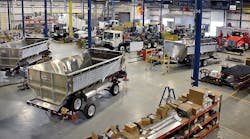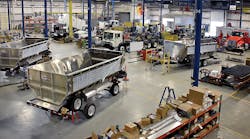Mix of products keeps American Road Machinery production running smoothly
Few if any products in the truck equipment business can match snow and ice equipment for volatility. That’s because demand for the product is pinned to something very finicky—the weather.
Yet manufacturing snow plows and up-fitting snow trucks requires skilled people who need a steady job and not a seasonal gig.
“We want to build seasonally without having to send people home for six months when the season is over,” says Jeff Jerousek, director of sales and marketing for American Road Machinery. “So we have expanded our business model and entered markets that have enabled us to reduce the ups and downs of the snow equipment market.”
Founded as a snowplow manufacturer, the Canton, Ohio, American Road Machinery has added a wide range of both trailer-mounted and truck-mounted equipment, including heavy dump bodies, oil and gas equipment, vacuum tanks, septic tanks, grappler trucks, and a multi-product line of landscaping equipment.
“Our vision is to reinvent how mature markets like heavy dump trucks and snow and ice control equipment function,” Jerousek says. “This business has been set in stone for decades. Customers have conformed to how manufacturers do business. Our idea is to start with the customer and work our way back to build our business model around them. What does the customer do, where are their points of pain, how can we design equipment and a manufacturing model that provides more value? Most of all, can we deliver all of that at a time when the customer needs it, rather than at a time when it’s convenient for us to build it? To do that, we needed to level the demand cycle. And to level the demand cycle, we had to become both a manufacturer and a distributor of counter seasonal products across multiple industries.”
Jerousek points out that the entire truck equipment business tends to be seasonal, but that the snow and ice control segment in particular struggles with seasonal demand spikes and lulls that plague our demand curves.
“To combat this, most companies draw out lead-times to help flatten out the curve and to provide a more manageable production plan which in turn causes the customer to wait on delivery. At ARM, we use counter-seasonal products within multiple industries and a highly cross-trained workforce to balance out our demand curve. This allows us to provide a much more responsive in-season production schedule for our customers.”
Let’s take a look at the calendar through the eyes of the ARM production department. Management points out that heavy-duty dump bodies tend to be the strongest at the beginning of the year, peaking in April but running fairly strong into September. Leaf production peaks in June and runs through October. After these products have peaked, demand for snow and ice control equipment begins to pick up in July and runs through December.
“If we can keep our staffing levels consistent throughout the year, we can handle the expected and the occasional emergency,” Jerousek “We had an example recently where one of our municipal customers had a fire in the garage. The fire damaged every snowplow truck that they owned. They had nothing to plow with. We were able to offer them a speedy turnaround and flexibility because of the system we have. Ours is a different way of doing business, but it works for us. If we have the body in stock, we can deliver a completed heavy dump or plow truck to their specs in under 4 weeks. We can also deliver custom builds in as little as 8-10 weeks.
“There are many successful companies in this business, and they have a different business model from ours. If we were to do the same things bigger companies do, we would beating our heads against the wall. Why try to out-Walmart Walmart?”
The strategy seems to be paying off. According to Jerousek, ARM is up 300% over the past three years and expects to double current sales in the next two years.
More than just markets
But there is more to the growth of ARM than simply the markets in which the company participates. New ownership has brought a new perspective to ARM.
Tom Blackerby, CEO, and Ted Swaldo bought American Road Machinery in 2014, bringing with them extensive experience in the automotive industry. The two owned a company that manufactures water pumps and other accessories to car and light truck manufacturers. They have since sold that company to a private equity firm, but they brought their experience with them when they acquired ARM.
“We noticed a big difference in automotive and truck equipment businesses,” Blackerby says. “I see a need in the truck equipment business for more repeatable processes, consistent wiring standards, and a standardized way of building customized vehicles. The truck equipment industry provides a great service by enabling the customer to get the product he needs, but we need to do a better job of building a model that not only delivers the product but creates value by delivering it when they need it most.”
Blackerby and Swaldo went to work immediately implementing new systems at ARM—including an assembly line for upfitting heavy dump and snowplow trucks. The company employs two parallel lines—one to manufacture the dump body and the other to prep the chassis. The two lines converge at the end, forming a single line which performs the actual upfitting.
“This allows us to batch upfit our jobs,” Jerousek says. “Depending upon the complexity of the truck, we have up to four upfitting stations. Each workstation is tied to our computer system. This gives our techs access to 3-D drawings that tell them exactly what they need to do at each station. Everything we do is engineered in detail before we ever start work. We don’t believe in making things up as we go.”
The engineering drawings, along with quality control inspections at each workstation, help ARM nip mistakes at the source and improve overall quality control.
“We have a five-page inspection document for a plow truck,” Jerousek says. “If something is wrong, we log it and trace it back to the cause.”
The assembly line approach speeds production. With the truck itself moving through the process rather than having the techs come to the truck, the shop can equip each station with the tools and equipment required.
An app for that
The shop is organized into cross-trained teams. Because of the variety of products ARM manufactures, communication within and between teams becomes exceptionally important.
One tool to help the teams work together smoother is Slack, a low-cost app available for use on desktop computers and cell phones.
Slack brings team communication and collaboration into one place. It includes basic functions such as to-do lists, but its specialty is connecting people, conversations, and information. It can organize conversations by topics, sends messages or phone calls to any or all team members, share and edit documents and searches a central knowledge base that automatically indexes and archives a team’s past conversations and files.
“We want a visual history of the build, so we photograph everything during production,” Jerousek says. “We probably shoot 30-40 photos, including inspection. Slack organizes these photos, and it also supports video. For example, we can use it to show a 130-second lift cycle of a dump body.”
New plant
ARM moved into a new facility about four years ago. The building provides 110,000 square feet of manufacturing space, plus additional room for administrative and engineering functions. The company set up the production space primarily for manufacturing, but it also includes plenty of space for up to 12 concurrent truck equipment installations.
Originally a snowplow OEM, American Road Machinery has grown into a hybrid company that is both manufacturer and upfitter. The manufacturing capabilities provide ARM the upfitter with a number of advantages, including access to sophisticated machine tools and the flexibility to design and deliver exactly what their customer want, when they need it.
Manufacturing plus upfitting optimizes capital, management believes.
“We outsource some of the fabrication that our upfits require,” Jerousek says. “But by sharing a building with our manufacturing operation, we produce much of what our shop requires. It all comes down to creating the best value for our customer. Our entire business is built around creating the best value curve we can for our customer base.”
ARM made major investments to equip the manufacturing operation.
“Our management has an automotive mindset,” Jerousek says. Quality and control are important, so we invested heavily on tooling, equipment and machinery that deliver consistent quality at industry leading speed. If we didn’t extensively use jigs, fixtures, engineered builds and our computer controlled production equipment it’s easy to lose control of quality.” ARM also utilizes a FARO Arm Scanner to map truck frames into precision, 3-D engineering drawings to ensure truck build plans are accurate and speedy to execute. “This process takes the guess work out of the build for our techs and allows us to inspect against very precise layouts to ensure the build is accurate,” Blackerby said. “This is one of the big innovations we are bringing into the industry.”
Although they are capable of manufacturing their own dump bodies, ARM also is a dump body distributor.
“We are Brandon Truck Equipment’s largest distributor,” Jerousek says. “We want to make good use of our engineering and manufacturing resources, so we sell other manufacturers’ products whenever it makes sense for us to do so. We outsource what makes sense, but with the idea of doing what’s best for the customer. We invest in delivering only what customer values. We work very closely with Brandon to continuously improve our collective bed designs to increase functionality as well as decrease install times, it a great partnership.
Much of the company’s decision making is based on value curves in which ARM graphs customers’ desired levels of measurables like durability, paint finish, delivery speed, cost, and warranty coverage to allow them to build their business plan around what customers want or “value’ vs. things they don’t see value in or simply cause them pain.
“These sometimes conflicting values can be graphed,” Jerousek says. “And if a decision falls in a certain area on the graph, that indicates that the customer does not value it. We make it a point to not spend resources on things that the customer does not value.”
New sales from safety
If we start with the premise that snow and ice control equipment exists to make streets and highways safer, ARM has been in the safety business since its beginning. But safety equipment takes many forms. Recently the company has expanded the scope, standardizing on prewiring chassis to accept backup cameras and offering side underride guards to make trucks compliant with Vision Zero / Volpe standards. They have brought technology into the vocational truck market that was once reserved for high end automotive design houses in an effort to make customized side underride guards both economical and safe.
As has been reported in Trailer/Body Builders in recent years, several cities in the United States are beginning to require side underride guards on some of the trucks they buy.
Vision Zero, a program created with the goal of eliminating traffic deaths in urban areas, is particularly strong in major cities in the Northeast, including Boston and New York. ARM has developed its own side underride guards that comply with the requirements of the program.
“Our focus is on building a flexible process,” Jerousek says. “We are constantly rethinking the plan. There are some great competitors in this business and we can’t control what they do. That said, we’ve developed an approach that works for us, and one that allows us to create the most value we can for our customers.”










